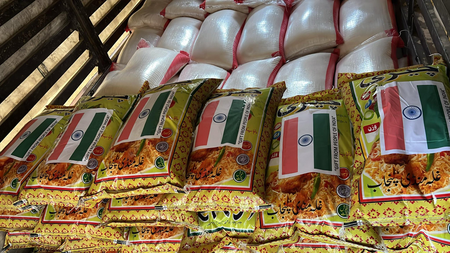New Delhi, Sep 6 (IANS) The humanitarian aid dispatched by New Delhi immediately after the initial earthquake rocked the southeastern parts of Afghanistan at the end of August is not a gesture in isolation.
Though India has not granted recognition to the Taliban rulers in Kabul, it has continued its outreach for the common people’s benefit in this beleaguered country.
India’s evolving engagement with the Taliban is not a matter of ideological alignment, but of geopolitical necessity. Since the regime’s return to power in Aug 2021, New Delhi has recalibrated its approach from outright rejection to cautious diplomacy.
India’s engagement with the Taliban is driven by a range of strategic imperatives. A stable Afghan regime can help deny Pakistan-based terror proxies safe havens, bolstering India’s border security.
Afghanistan also serves as a vital land bridge to Central Asia and the Chabahar port corridor, offering New Delhi alternative access for trade and energy resources.
Incidentally, a Parliamentary Standing Committee report, tabled in March this year, underscored the need for projects and programmes aimed at the welfare of women and children in Afghanistan.
It noted that the allocation for ‘Aid to Afghanistan’ was Rs 200 crores during the Budget Estimate (BE) 2024-25, but was revised to Rs 50 crores in the Revised Estimate (RE) stage.
It was then increased to Rs 100 crores in BE 2025-26.
According to the External Affairs Ministry, budgetary allocation to Afghanistan since Aug 2021 was primarily aimed at stabilising the country in terms of food security, medicines and emergency supplies.
The report quoted the Ministry that, now that these efforts have been fruitful, leading to marked improvement in these areas, it has been decided to explore development cooperation projects in addition to the ongoing humanitarian aid.
Earlier, India put in a total of USD 3 billion for dams, hospitals and education even before 2021. The Taliban is seeking New Delhi’s help in several construction projects. Operations may soon be revived as security stabilises.
New Delhi faces challenges in moving men and material via the land route as it lies through Pakistan, where several bureaucratic and political roadblocks are often created. Additionally, skirmishes at the Af-Pak border lead to long waits at the entry point.
Despite several other difficulties, India has successfully invested in several long-standing humanitarian and reconstruction investments. Such gestures have helped build goodwill, countering the “Great Game” played by other countries.
The history of such manoeuvrings has been chronicled by Peter Hopkirk, who authored the book, ‘The Great Game’.
He wrote extensively about the diplomatic significance of Afghanistan, documenting overt and covert battles fought in the region for centuries.
The title of the book – borrowed from the phrase and term coined by a British intelligence officer, Captain Arthur Conolly, in the 19th century – aptly sums up the diplomatic one-upmanship.
While some experts believe that India does not have a clear policy regarding Afghanistan, others prefer to term it as strategic patience.
But throughout this time, New Delhi reworked and re-strategised its options. In fact, India has reached out to the successive governments in Kabul.
In recent times, following the meeting between Foreign Secretary Vikram Misri with the Acting Foreign Minister of Afghanistan, Mawlawi Amir Khan Muttaqi, in Dubai early this year, it was decided to explore development cooperation projects in addition to the ongoing humanitarian aid.
Afghanistan was among the nations that denounced the Pahalgam. Muttaqi had called up External Affairs Minister S. Jaishankar to convey their feeling.
Soon after the recent earthquake, Jaishankar held a telephonic conversation with Muttaqi and expressed condolences at the loss of lives.
The efforts continue, but a pragmatic approach has to be followed. India can not be a helpless bystander in the next “Great Game”.
–IANS
jb/dan
Disclaimer
The information contained in this website is for general information purposes only. The information is provided by BhaskarLive.in and while we endeavour to keep the information up to date and correct, we make no representations or warranties of any kind, express or implied, about the completeness, accuracy, reliability, suitability or availability with respect to the website or the information, products, services, or related graphics contained on the website for any purpose. Any reliance you place on such information is therefore strictly at your own risk.
In no event will we be liable for any loss or damage including without limitation, indirect or consequential loss or damage, or any loss or damage whatsoever arising from loss of data or profits arising out of, or in connection with, the use of this website.
Through this website you are able to link to other websites which are not under the control of BhaskarLive.in We have no control over the nature, content and availability of those sites. The inclusion of any links does not necessarily imply a recommendation or endorse the views expressed within them.
Every effort is made to keep the website up and running smoothly. However, BhaskarLive.in takes no responsibility for, and will not be liable for, the website being temporarily unavailable due to technical issues beyond our control.
For any legal details or query please visit original source link given with news or click on Go to Source.
Our translation service aims to offer the most accurate translation possible and we rarely experience any issues with news post. However, as the translation is carried out by third part tool there is a possibility for error to cause the occasional inaccuracy. We therefore require you to accept this disclaimer before confirming any translation news with us.
If you are not willing to accept this disclaimer then we recommend reading news post in its original language.

